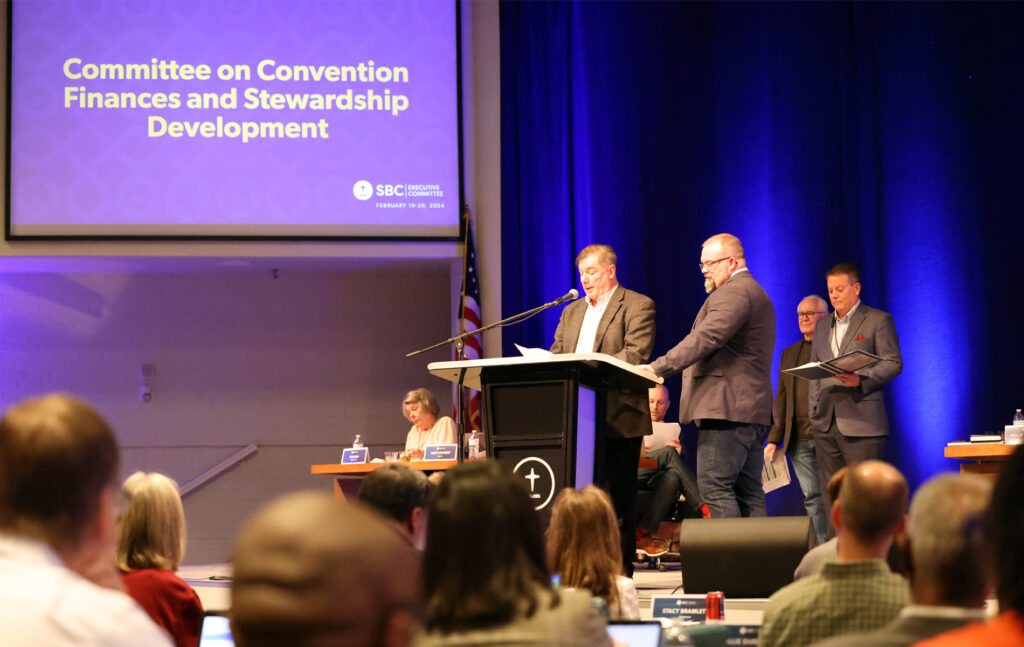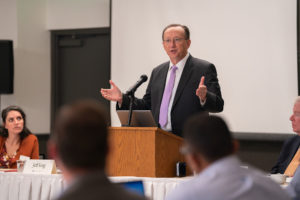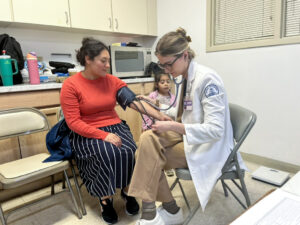
NASHVILLE (BP) — Executive Committee members voted Feb. 20 to recommend a 2024-25 Cooperative Program Allocation Budget of $190,250,000 based on current CP receipts and detailed predictive analysis of state convention projected budgets.
That figure marks a decrease from the 2023-24 budget of $195,250,000 and will be voted on by messengers at the annual meeting in Indianapolis, June 11-12.
Allocation percentages for Cooperative Program gifts forwarded on to Southern Baptist entities will remain unchanged, said Convention Finances and Stewardship Development chair Adam Wyatt.
The first quarter of the fiscal year, which began Oct. 1, 2023, and ended Dec. 31, showed a 1.41 percent decrease in CP Allocation Budget receipts between 2022-23 and 2023-24. However, the SBC Operating Budget Report revealed a positive total change in net assets of $407,736.
An Executive Committee and SBC Operating Budget of $10,235,000 was recommended for 2024-25. The amount is slightly more than the $10 million budgeted for 2023-24, but less than the $12,813,947 actually spent in the 2022-2023 fiscal year.
Wyatt informed trustees that his committee had received audit information on the Executive Committee, but not a final version.
EC Chairman Philip Robertson added that the Executive Committee had received an unmodified, or clean, audit.
“We’re very grateful to the work of the staff to maintain that financial status. There’s been a lot of work and intentionality to help bring that to pass,” he said.
Auditors qualified the Executive Committee’s finances as viable, the same as the audit conducted last year.
“There was a lot of concern last year,” Wyatt said. “We’re where we were from the official audit perspective, which means we’re not worse off, and that’s a good thing because it means we’ve held steady.”
Changes contributing to that report include downsizing of staff that occurred last fall.
“The challenge is that we want to protect the Cooperative Program but also do the will of the messengers that have these unintended consequences. We have to figure out how to pay for it while making sure everyone gets the correct percentage amount.”
Questions and concerns
Trustee John Batts, pastor of First Baptist Church Clear Lake in Mount Vernon, Wash., asked several clarifying questions during the report that were neither directed nor received in an adversarial tone.
“The heartbeat of what we do in the SBC is built around the Cooperative Program and sharing those expenses and it’s important that we’re being good stewards,” Batts said.
Two recommendations were tabled for further discussion and a vote at the EC’s next meeting on June 10 in Indianapolis. One called to amend the Business and Financial Plan to include financial reports with information required by a Form 990 to be included in the Book of Reports. The other was a motion calling for entities to submit information found in a Form 990 to the SBC.
Rhett Burns, pastor of First Baptist Church in Travelers Rest, S.C., made the latter motion at the New Orleans annual meeting last summer and spoke to it with finance committee members before speaking directly with Baptist Press.
Burns cited a “culture of suspicion and distress” in the SBC as his motivation in bringing the motion, a scenario he called “unfortunate.”
“This isn’t a silver bullet, but it’s a meaningful and significant step to have greater financial transparency in order to restore trust,” he said.
The Form 990 is the Internal Revenue Service’s primary tool for gathering information about tax-exempt organizations. The Southern Baptist Convention and its entities, as religious organizations, are not required to use the form.
While stating that items such as executive compensation, top contractors and information related to conflicts of interest would be helpful for Southern Baptists to know regarding entities, Burns stressed he was not implying that the SBC has problems in those areas.
But a “level of trust” can be gained with that information, he said.
“We’ve given 10 percent to the Cooperative Program for a long time at my church before I got there,” he said. “A significant part of our budget is going to those causes.”















